A Chinese Family’s Duty : Gluttony
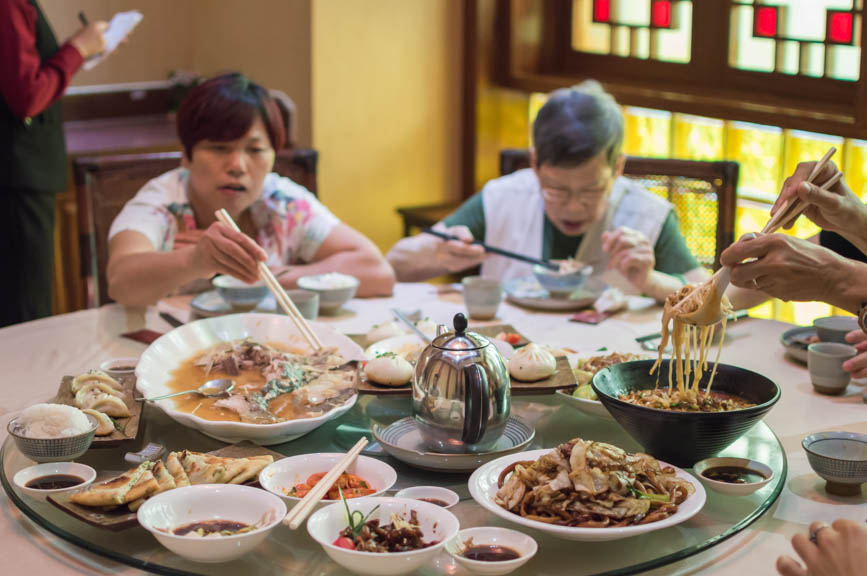
gluttony \ˈglət-nē, ˈglə-tə-nē\ – the act or habit of eating and drinking too much
It took about 45 minutes from when we stepped off the train for the feeding frenzy to begin. And it continued, full speed ahead, for the rest of our 30-hour stay in Liu Bo 寮步. We had taken the train from Hong Kong to Dong Guan, a now-important industrial city north of Shenzhen within the province of Guangdong in Southern China. What used to be a small agricultural town, has now become a massive industrial hub encompassing 32 towns with a population of over 8 million people. One of those 32 towns is Liu Bo, the mini-metropolis that has engulfed the small village where my maternal grandfather was born.
My grandmother was born in Hong Kong, while my grandfather moved there when he was only 12 years old, working his way up to the life they enjoyed as adults. About 17 years ago, they decided to move back to Liu Bo from Hong Kong, the hometown which was never far from my grandfather’s heart. Dong Guan is actually where the family origins of over 700 000 people in Hong Kong are found and my grandfather had stayed close to the extended family he left behind all those years ago.
Now however, my grandmother was in charge of the family legacy and that of course includes making sure that everyone is well-fed. Two days before we arrived, she called my mother to ask her what we wanted to eat. This was only the beginning, a warning sign of what was to come and an experience familiar to anyone who has a large Cantonese family.
It is difficult to pinpoint what I want to eat when I know the choices are never-ending, especially when I know that no matter what I do, we will end up stuffing ourselves for two days and the food will be very very good. From my childhood memories of visiting my grandmother in Hong Kong, there were only two things I craved when I got there. A very simple yet perfect cabbage stir-fry with chinese bacon and my grandmother’s funny habit of pouring evaporated milk over fruit jelly, which is absolutely delicious. Luckily, this time, my mother had clearer ideas in her head, she wanted crab for dinner. A crab they call bread crab, because well it kind of looks like a loaf of bread.
But dinner is still hours away, so we are first whisked off for lunch. They had decided on this new Shanghainese restaurant in town, because there was a special fish to try. We drive past skyscrapers and yards filled with abandoned cars, tree-lined highways and overgrown plots with dusty banana trees, until we get to a shiny new shopping mall and take the lift to the third floor. Inside a cool dark room with coloured glass windows, we all settle down to glimpse at the menu. All 8 of us, grandmother, cousins, second cousins and us stare at pages and pages of options until we are all relieved when my mother takes over. She is the queen of ordering and when it comes to food, she knows what she wants.
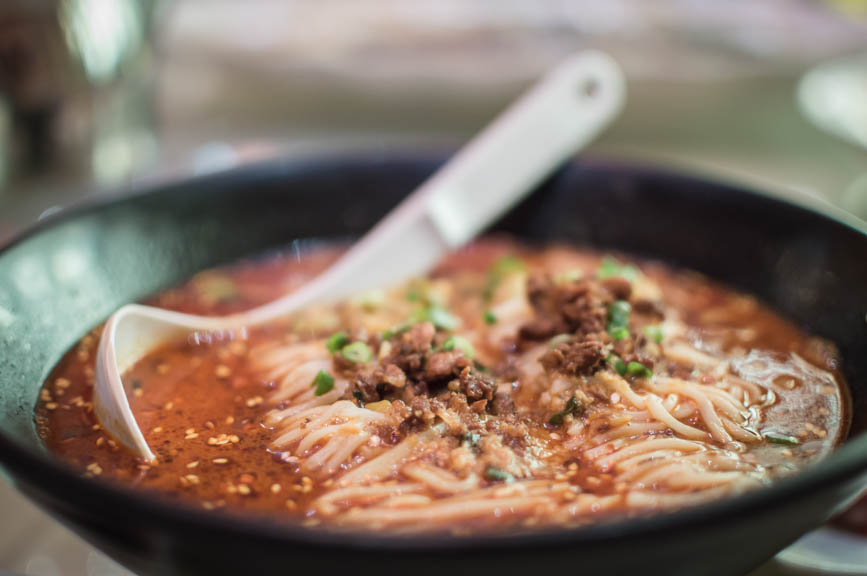
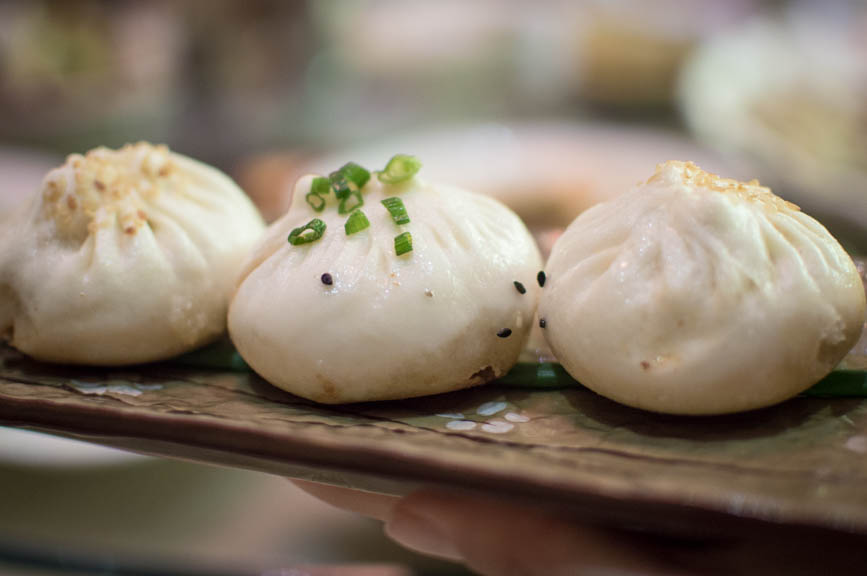
The dishes start materialising one by one, each more beautiful than the other. Shanghainese soupy steamed dumplings (xiaolongbao 小籠包) , spicy dan dan noodles, chinese jellied ham, sizzling onion cakes, fresh peas simmered with chinese bacon, translucent baby shrimps, pan-fried “pot-sticker” dumplings, thick cut Shanghainese noodles, more steamed pork buns and the most surprisingly delicate turnip puff. First grandmother is served and then it is a free-for-all as everyone digs in to their favourite dish. There is something about how chinese food is served, that always leads to eating too fast or too much. Maybe it is the fact that it is all presented to you at the same time and that at the very moment you are chewing on one thing, your eye is already distracted by the next thing you want to devour. Or the fact that if you are not fast, someone else is going to grab it, so you calculate your chances, there are 4 pieces for 8 people, how are you going to do this? A passive eater will never succeed, you need to be decisive, measured and take action. Politely, of course.
Then the fish appears. The famous Si Yu 鰣魚 or “Time Fish” as I like to call it, because that’s what it sounds like in cantonese. Its actual english name is Reeves Shad, a river fish which used to be abundant in China’s rivers, but due to dam construction, overfishing and pollution, Shad resources there are almost extinct. I only learnt this afterwards and turns out that a lot of Shad in China is actually imported from the US (where it is more abundant), Singapore and Indonesia, making the fish even more expensive. Often, only half of the fish is served as it is so precious, but to be honest, it’s not really about the fish, it is about the sauce. The fish is drenched and steamed in a special rice wine which leaves actual rice grains behind as evidence, making it unusually fragrant and sweet. It is a dish reserved for special guests.
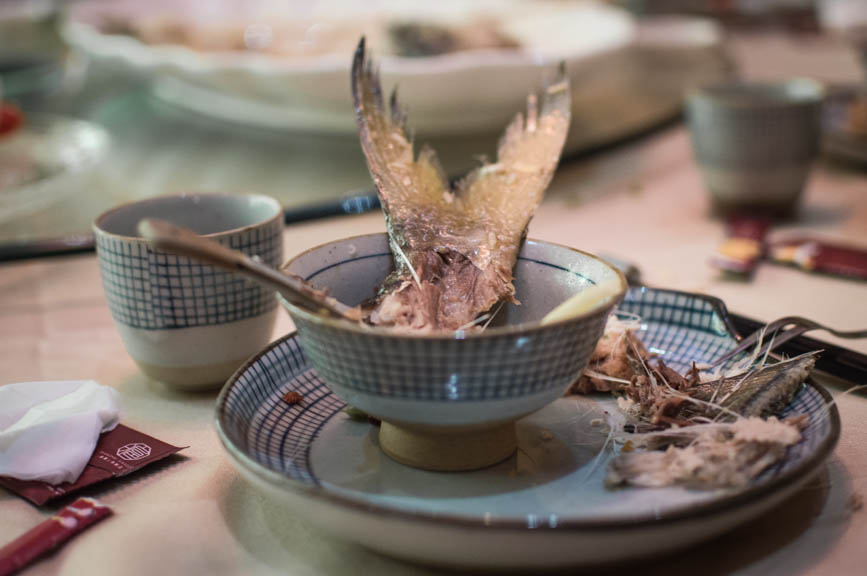
All but the bones and tail are left as we shuffle back out into the harsh daylight, slow and drunk from food. We walk around for awhile, an attempt at improving digestion before heading back home. On our way, my grandmother spots a place known for its steamed milk custard and suggests dessert. If you think that Chinese cuisine does not offer much for the sweet tooth, you haven’t tried steamed milk custard. This is no ordinary custard, this is ginger steamed milk. In some kind of scientific miracle, the pouring of ginger syrup with hot milk causes the mixture to set with just the right wobble, without any setting agent like gelatine or agar agar. Delicate and creamy spoonfuls end with a violent kick of spicy ginger. I’ve had overly sweet versions before, but this one was almost medicinal, if you have a blocked nose, this is your saviour. I was still finishing mine when my grandmother ordered her second bowl. My 87 year old grandmother is a trim lady, she eats healthy and never too much, but if there is something she loves, she will not hesitate. There is always room for a second bowl of ginger steamed milk.
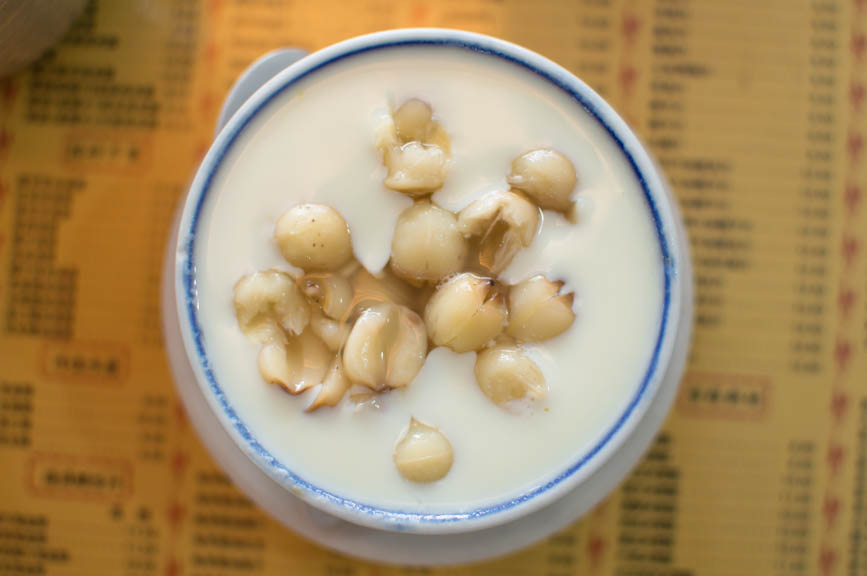
Now uncomfortably full, we finally head on back with a detour to my grandfather’s old village so that I can show Nico the house where my grandfather was born. In China’s obsession with the new, the crumbling village has been incredibly spared, the main temple worshipping their 300 years of ancestors is still standing and renovated with care. We walk through the narrow alleys fringed by carved wooden doors and grey bricks, the houses tightly knit together, the curved eaves of their roofs barely touching, their black tiles scorching in the sun. Yet inside the abandoned house it is cool. A water pump still stands in the corner of the internal courtyard, next to it the old kitchen with its double-hole stove top, just big enough to hold two woks over the fire burning underneath. The bedroom is dark, but the outline of the bed is clearly visible, the old mosquito net now so heavy with dust it looks like a thick blanket. There are still old photos on the wall, of my grandfather’s sister and my first Uncle with my cousin when he was a baby. We consider taking the photo of my grand-aunt home to preserve it, but are quickly told you should never take photos of dead people home or at least not move them. Sun rays shine through the floorboards on the second floor, but it is no longer stable enough for us to go up and I wonder what will happen to this house in the future. How long will it remain untouched with its memories preserved within its walls?
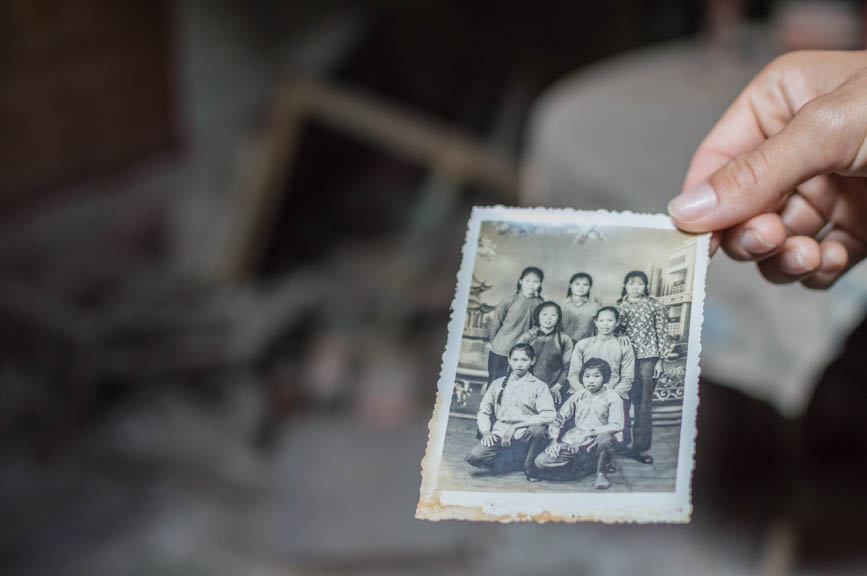
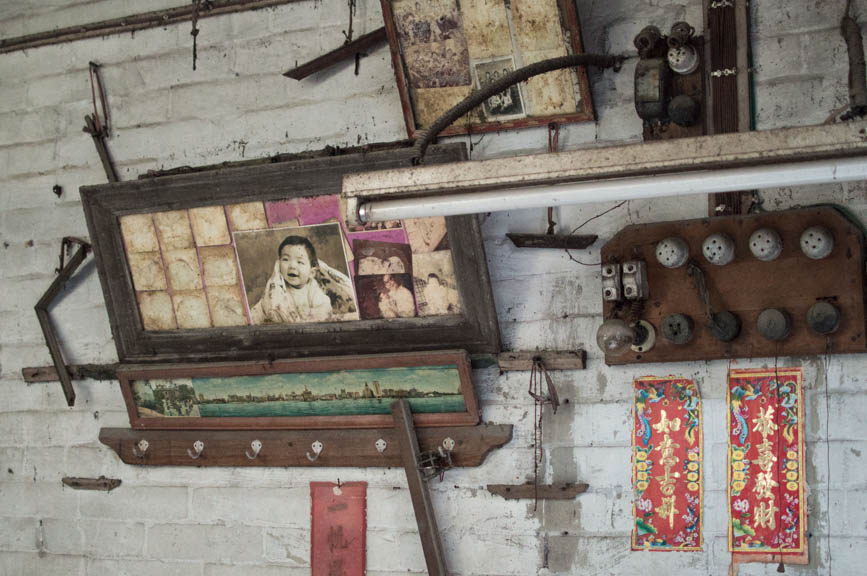
They are calling our names as we head on out and I try to imagine what it would have been like to grow up here. How different my grandfather’s life had been from his siblings because he had managed to make it to Hong Kong? So many questions and stories I still need to ask and track down. We pass the market first to pick up what looks like a month’s supply of fruit, before finally arriving home. When my grandparents first built their home there, it was surrounded by fields, the only big house standing in a quiet corner. In less than ten years, the town has crawled its way to their doorstep, looking more like a mismatched suburb of Liu Bo.
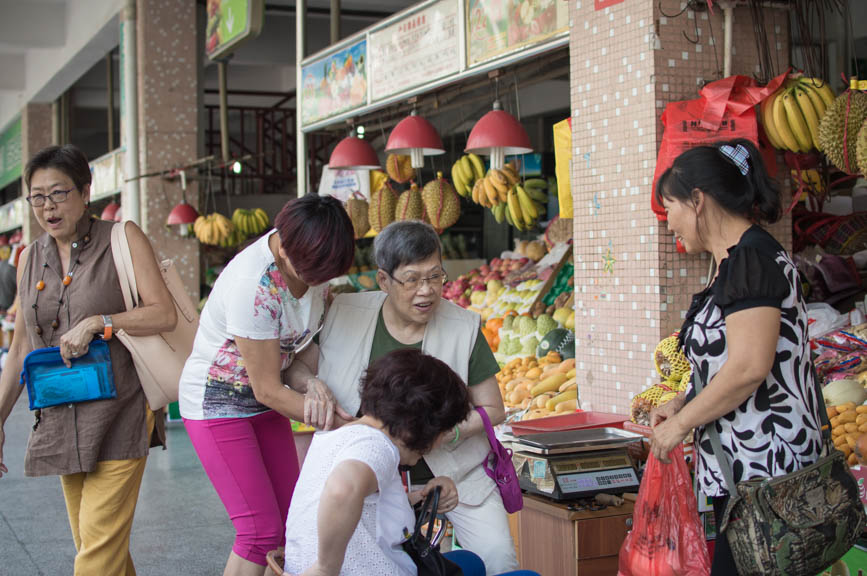
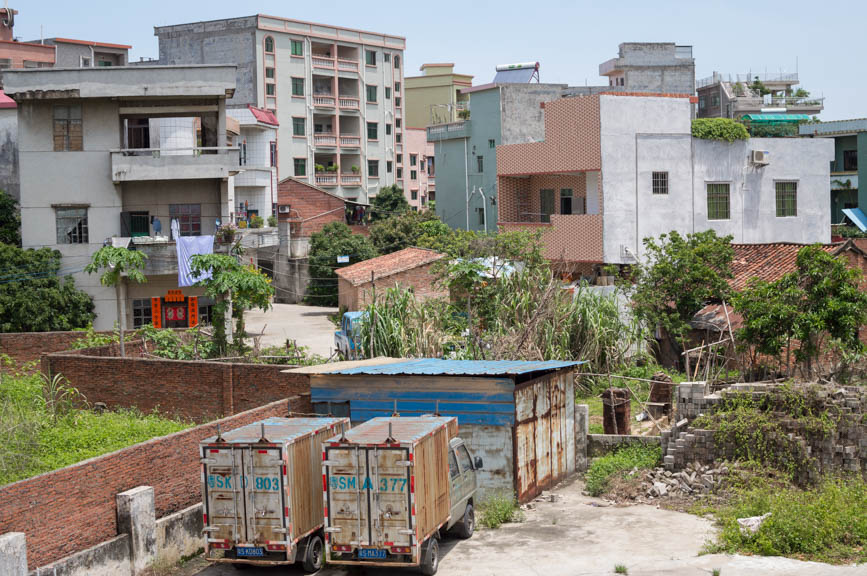
It was supposed to be hours before dinner and just as we were settling in, someone starts calling for us. I felt like we were in the German countryside and someone was calling us to take our supper at 6PM (which my Italian side finds scandalous). But we only finished eating a couple of hours ago! The answer was the suckling pig has arrived, do you want it to get cold? My grandmother had ordered a small suckling pig. And two bread crabs had been prepared. And a specially roasted chicken because the ones in China taste like real chicken and the ones in Hong Kong taste like nothing. We were five people and three animals.
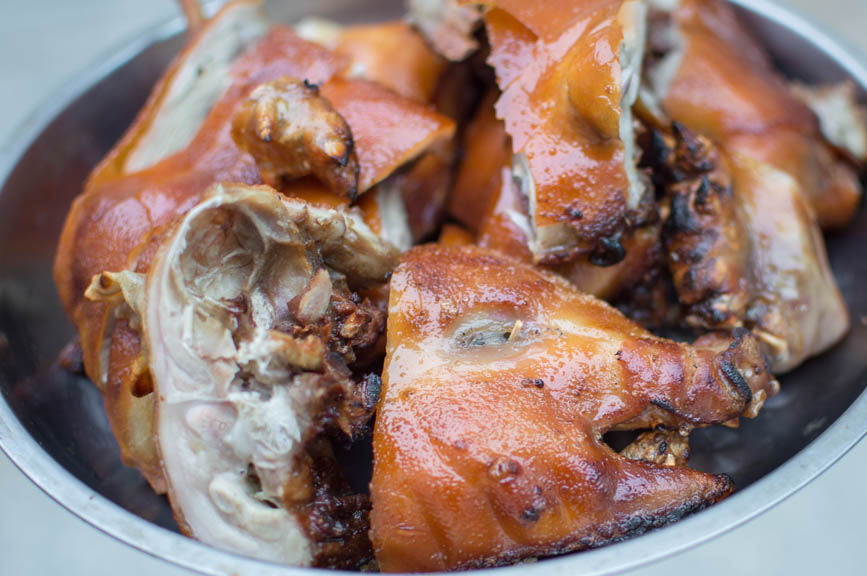
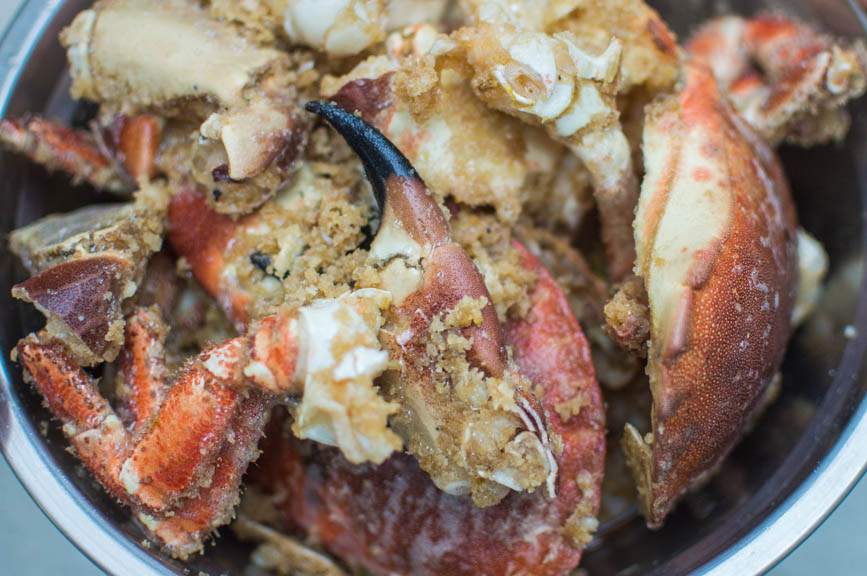
An internal battle begins, all this good food and no space! You have to have at least one piece of the suckling pig. And perhaps another one. Crunchy rich pork crackling with juicy succulent meat dipped in salt and white pepper. Bones to clean and more crackling to chew. The crab rich with spring onions and butter, chopped into pieces supposedly easy to crack open, until Nico looks around for a nutcracker and everyone says use your teeth! Then came the chicken, real chicken with real chicken flavour and tender meat encased in more crispy skin. This was not a cholesterol friendly dinner and definitely not for the faint-hearted. Self-control flew out the window and Nico being the first-time visitor was a special target for fattening up. Eat Eat Eat! God forbid a guest leave hungry.
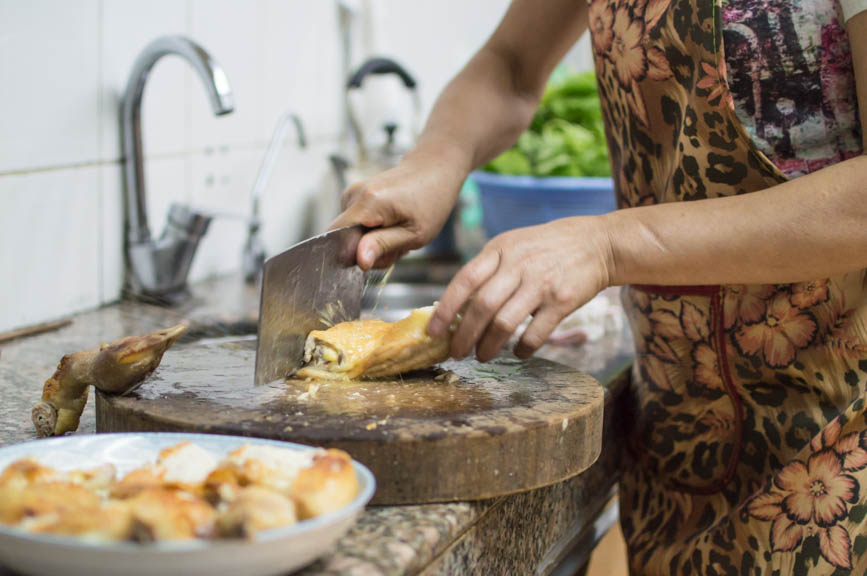
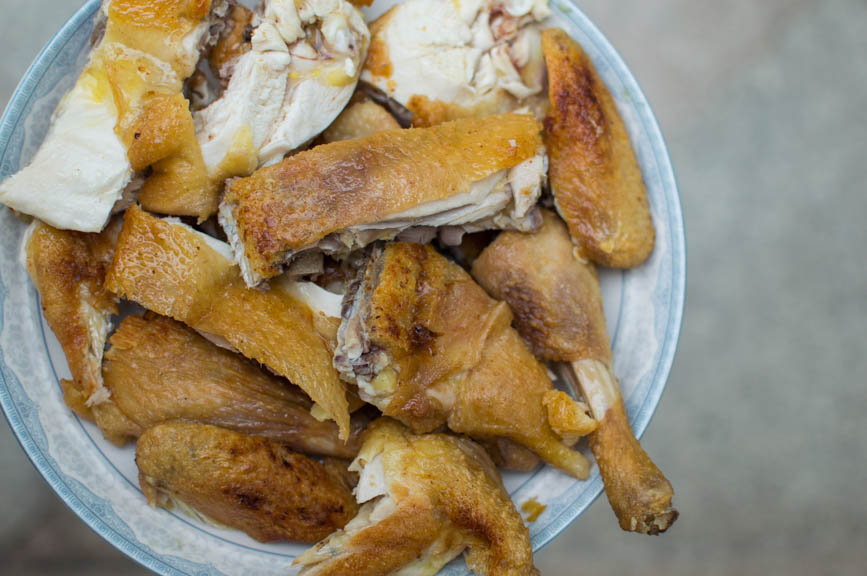
We had surpassed the feeling of being full, this was on another level. I was dreaming of unbuckling my trousers when big bags of mangoes and lychees appeared, “very special ones” from some “special place” we had to try. I put mine in the fridge and said I would wait for it to get cold. My grandmother happily demonstrates how to peel a mango properly and passes on her words of wisdom with a laugh – “The best way to eat a mango is to eat it all by yourself.” As a child, they had to fight for a slice each and whoever got the stone could hang on to the mango flavour for longer. Now she could have as many as she wanted all to herself.
We chat away until the food coma gets the better of us and head on up to bed.
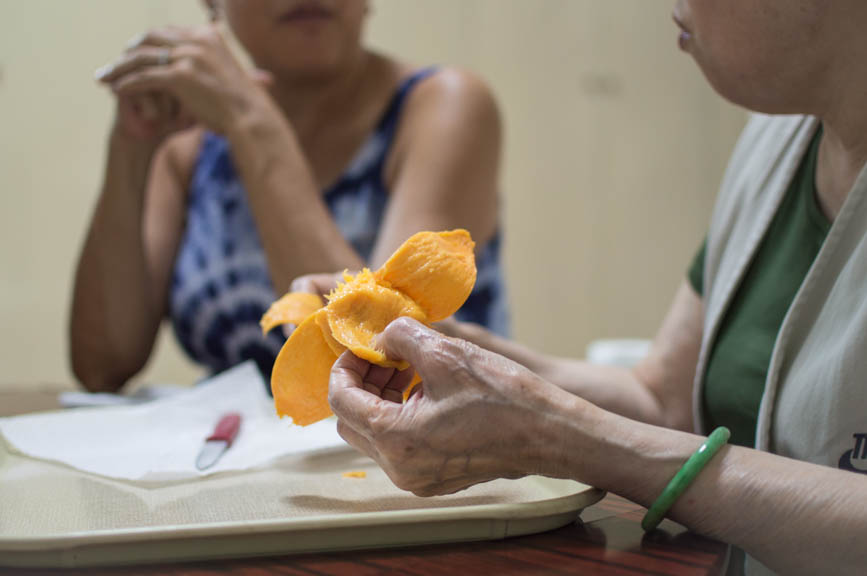
We are awoken by new calls to hurry up or we will miss breakfast. Knowing that we are interested in food, usually means even more effort is spent on making sure we try everything and for breakfast this means freshly made cheung fun 腸粉 . There are many stalls serving these sheets of freshly steamed rice noodles for breakfast, but the best one is at Lo Hon 羅康. A bustling family-run business just up the street from where my great-grandfather used to have his bookshop. Rice flour batter is poured onto thin metal sheets, minced pork or pork liver are sprinkled on top depending on your mood and an extra egg too if you feel like it. The tray is then slotted into a mini stove where it is steamed till just set and then the piping hot noodle sheet is rolled onto a plate, doused with sweet soya sauce and freshly chopped spring onions and Chinese parsley. Good morning to you too.
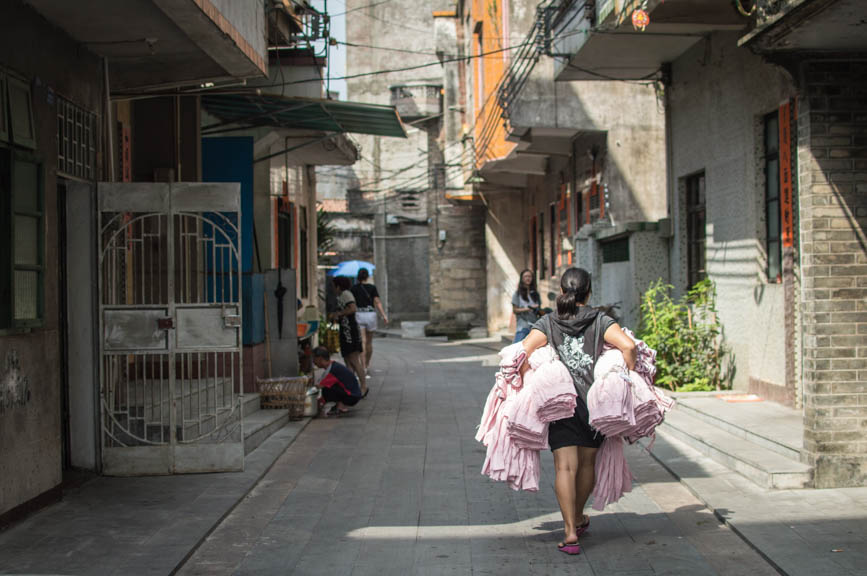
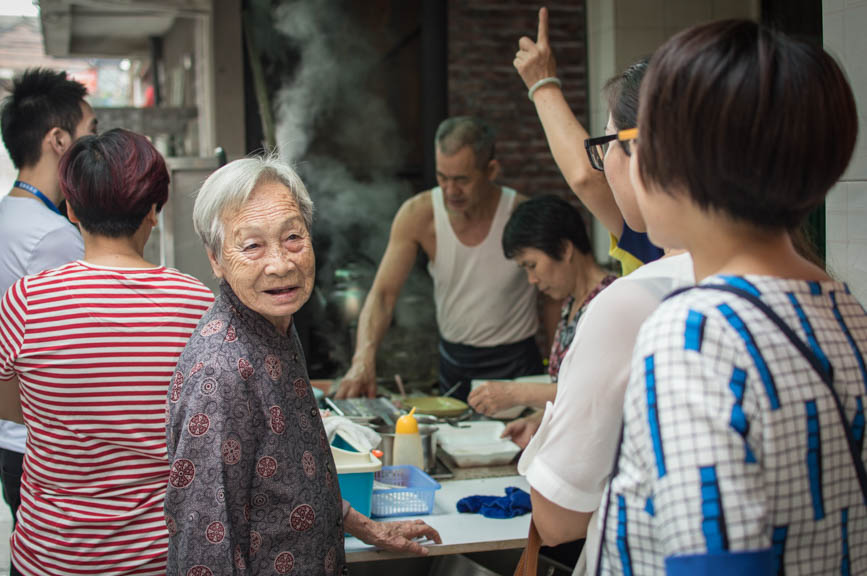
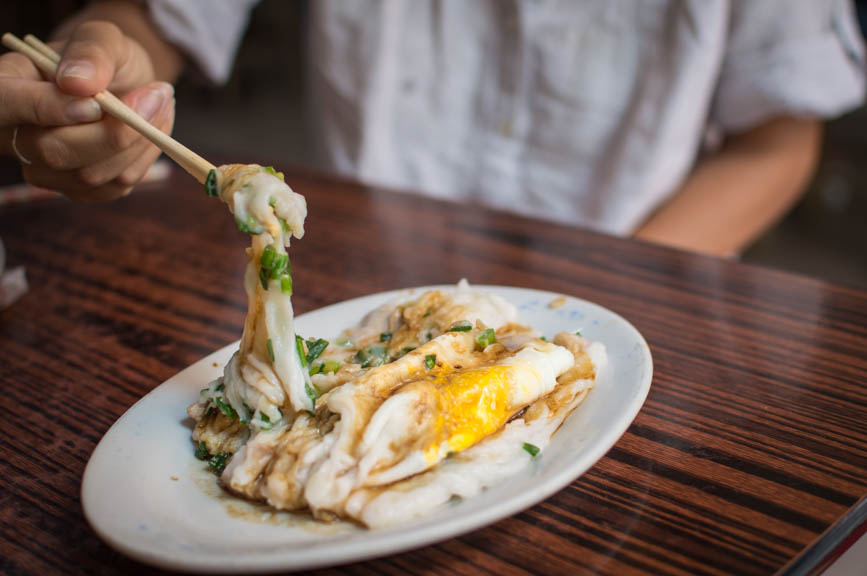
Out of curiosity, we pass the central market on our way back. Since I last saw it 17 years ago, it has changed a great deal. It has cleaned up its act, but still has the over-abundance, slight chaos and freshness which wet markets are synonymous with. Red lights illuminate meat stalls and fish mongers, vegetables are piled tidily into little pyramids and an old man is wrapping fresh wontons at his corner stall.
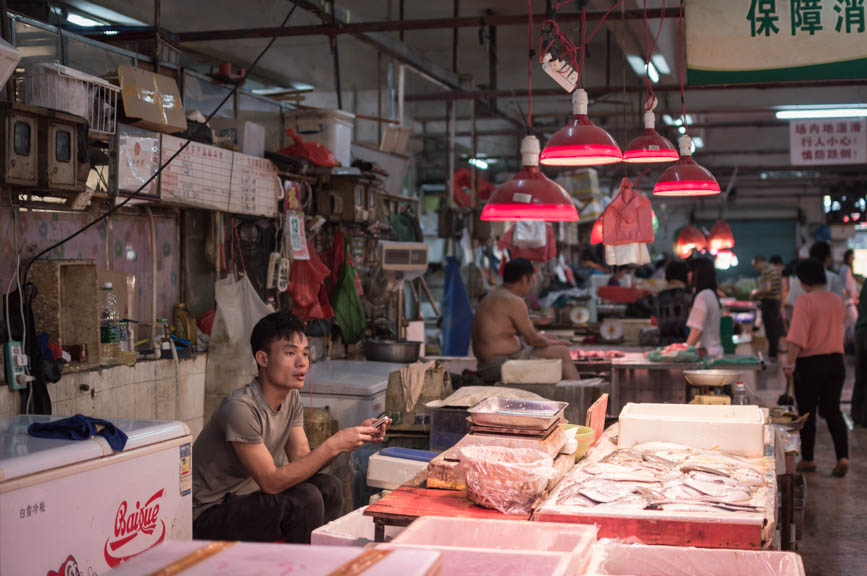
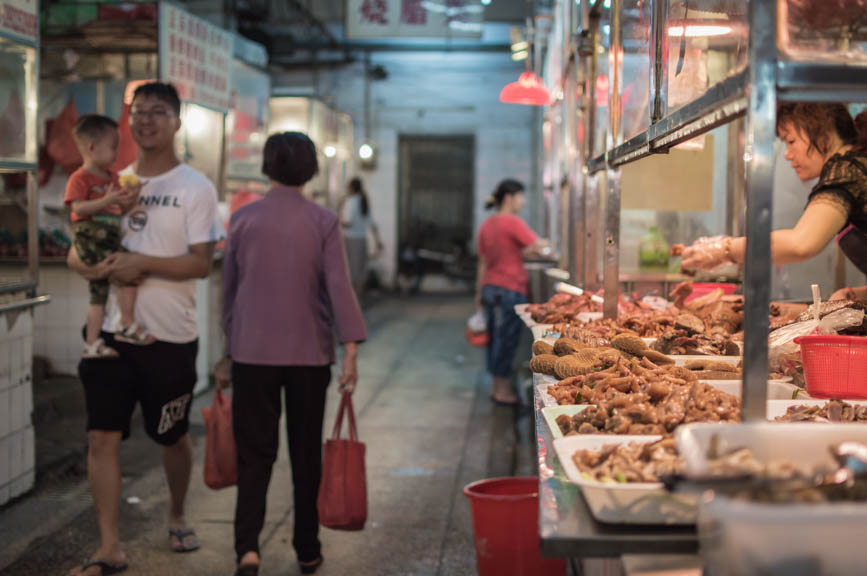
Back home, Nico ends up getting a mahjong lesson from my grandmother, who is extremely proud of his lucky novice hand and hours fly by. Finally an activity without any food involved. But before long it is time for our last meal in town and our cousin invites us to a restaurant where ladies-who-lunch go to. All the fanciest dishes are offered, but everyone around our table looks like they would be happy with a bowl of soup. Thankfully we don’t over order this time and end up with a semi-decadent lunch. One where Nico has to finish all the duck, because nobody wants the pieces without the bones.
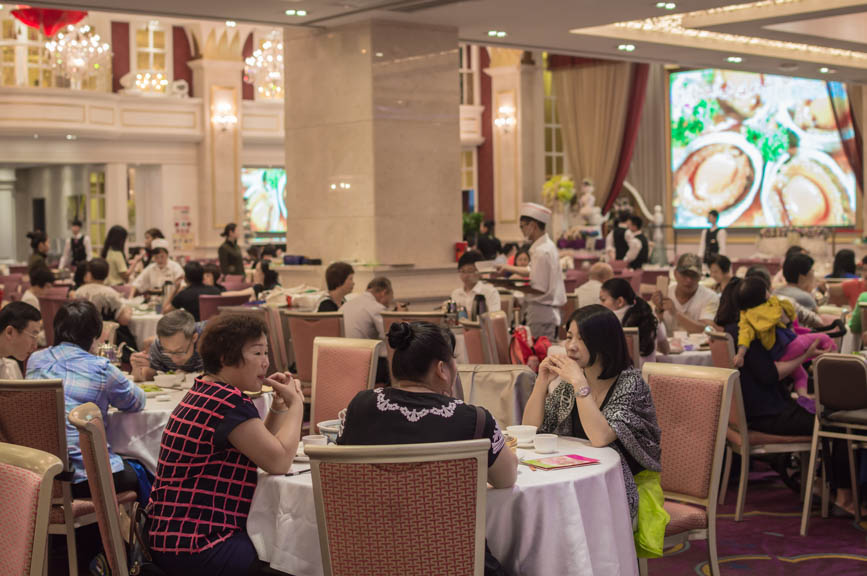
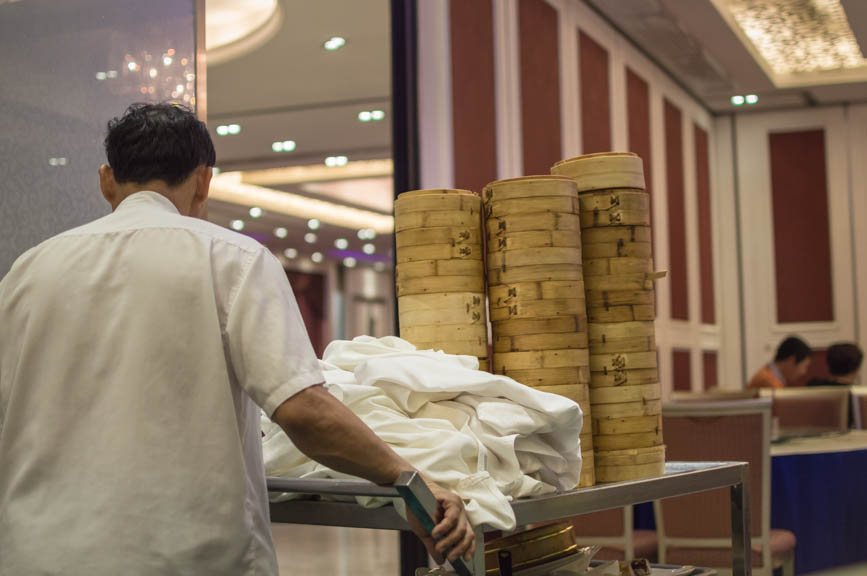
I really want to unbuckle my trousers again, but remember what my grandfather once said, “Never say you are full, because it means you do not appreciate all the food you have been given. It should not sound like a complaint.” In a culture where cuddles and affection were traditionally more limited, food was a way to show love. In China, food is now a way to show business clients your status, to save face, to up one another with exotic ingredients and expensive dishes. For family, it is to show that you care. It is a family’s duty to stuff you silly. For a large amount of the population, eating is to make up for lost time, for a time when food was more scarce and for the younger generation, this infatuation has been passed on.
I could not have grown up in this family and not have a passion for food. Whenever my grandmother offers to feed me, I know it is her way of making sure I have everything I need. Her hugs come in the form of steamed dumplings and mangoes. And I can have as many as I want. All to myself.
Word to the wise, whenever you are invited to eat in China, make sure you go hungry and wear something very loose.







11 Comments
tammy
May 25, 2015I loved this! So well written!
Nico & Gabi
May 26, 2015Thanks! 🙂
petra
May 26, 2015I loved reading this. I lived in Malaysia for a while. lots of Chinese there as well. and I ate at many Chinese restaurants. seeing the amount of food Chinese families would order and inhale [sorry] always made us laugh. but then again, what better way to be social than over food!
Nico & Gabi
May 26, 2015Thanks Petra, I can vividly imagine those restaurant scenes haha. And you are right, there is no better way!
J.S. - Sun Diego Eats
May 26, 2015This is beautifully written and quite handily relevant to me as well. I’m going to China for the first time in November to meet family in Shanghai I have never met before – my Chinese grandparents moved to Brazil in the 1940s and my dad grew up in Brazil but recently decided to move back to Shanghai. My sisters have already gone and have told me similar tales of vast feasts of dumplings and dishes we have never seen before as well as the hairy crab they always insist on serving when guests are visiting for the first time. I can only hope there’s some steamed ginger milk pudding at the end too.
Nico & Gabi
May 28, 2015Hi J.S, that sounds very exciting to meet your family for the first time in Shanghai! Very interesting that your dad moved back there too, must be a big change. Hope you will enjoy it, I haven’t been in over 10 years, but it has changed so much from the sounds of it and seems very dynamic. One of my aunts has moved there too now. Be prepared, you will definitely be stuffed! Shanghainese food is amazing and though the xiaolongbao dumpling is probably the most cliché of them all, it is still the best dumpling I have ever had in China, so enjoy the stuffing!
Dani
June 8, 2015wow! I get it now – “ahn – foot – toe – zatt” !! It makes sense after reading this 🙂 .
Nico & Gabi
June 8, 2015haha definitely! You would fit right in 🙂
laure
June 12, 2015gorgeously written, and I am enamored with your photos. I recently went on a trip to Hong Kong and China as well to visit family, so I am more than familiar with this love-through-gluttony phenonmenon you described so eloquently. Chinese families truly do know how to feed you so well that you come home 10 pounds heavier! Anyways, beautiful post. I will be reading some more.
P.S we also put evaporated milk on our fruit jello
Nico & Gabi
June 12, 2015Hi Laure, so funny that you also put evaporated milk on your fruit jello! It really is tastier that way 🙂 Glad you went through the Chinese family experience too, it’s definitely impossible to keep the weight off when they are so determined!
Dried Fish Maw
June 2, 2023In this moment we have in stock and ready to pick up in our warehouse of Hong Kong 260 pounds of female dried fish maw of big size (10 pcs/Kg) of old robalos at a price of 65€/Lb (Negotiable). If you are interested in buy this lot of dried fish maw we can send you videos and photos via WhatsApp or WeChat (Movil phone: 0034660997860) and if you are interested you can visit our warehouse before of the payment without problem to see in person the product. We are a big spanish company with many years of experience. Procedure: 1. The seller sends the buyer the photos, videos and the Intertek inspection to the buyer. 2. The buyer accepts the product and the price. 3. The buyer visits the warehouse and confirms the product in person. 4. The seller sends the buyer the proforma invoice via email. 5. The buyer makes the transfer to the seller’s bank in Spain. 6. The buyer picks up the product at the Hong Kong warehouse. Best regards. Mr. Francisco Javier Gutierrez. https://driedfishmaw.com